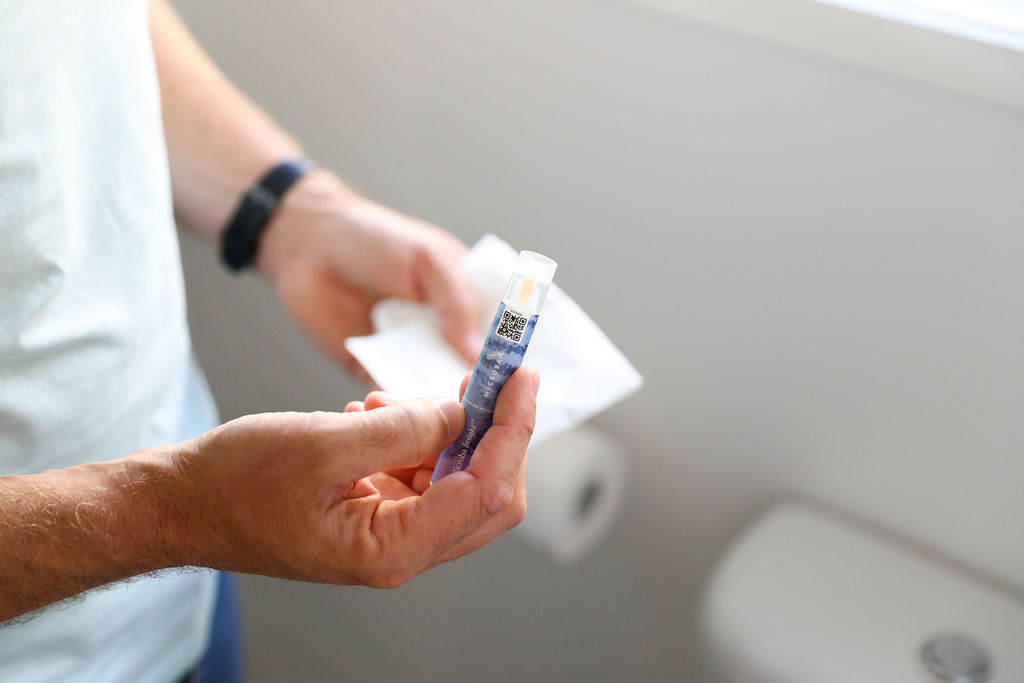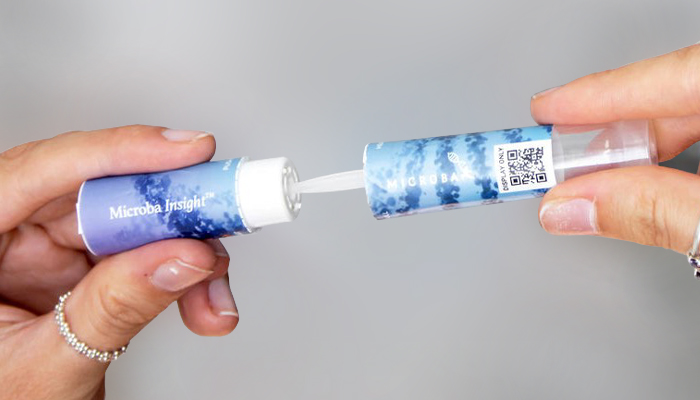
Diarrhea getting you down? Tummy pain cramping your social life? Turns out, the influence of the gut microbiome on mental health could be more than symptomatic.
For sufferers of digestive disorders, such as irritable bowel syndrome (IBS), it makes sense that ongoing digestive symptoms may impact mood by reducing quality of life. However, researchers and clinicians have long noted that many people with mental health or neurological conditions also report co-occurring digestive issues1-4.
Interestingly, research has linked changes in the gut microbiome to conditions such as IBS5, depression and anxiety6, 7, and even disorders such as autism, Alzheimer’s and schizophrenia8, 9. So, it seems our gut bacteria may be playing a role in these conditions9-11.
Interested to see the potential links between your microbiome and your overall health? Learn more about Microba Insight™.
‘But how on earth can our gut bacteria affect our mental health?’
The nature of this interaction between our gut and brain, also known as the ‘microbiome-gut-brain axis’, is not fully understood and is still an active area of research.
Scientists have known for a long while that the gut and the brain communicate with each other, but it has only been recently that scientists discovered the microorganisms in our gut also influence this communication. The back and forth exchange between the gut and brain was highlighted in a 12-year population-based study, investigating the relationship between mood and digestive disorders12.
The researchers found that participants with anxiety and/or depression at the beginning of the study were significantly more likely to have digestive disorders by the end of the study12.
This relationship was also found in the reverse direction, with digestive disorders at baseline being a significant predictor of anxiety and/or depression at the study’s conclusion12.
It is also clear that stress impacts on the gut microbiome13,14
When we are stressed or anxious, our body activates our stress response system, producing hormones such as cortisol13. Cortisol can impact gut function, increase gut permeability and change gut microbiota composition15. Therefore, stress management techniques such as exercise or meditation, may play an important part in maintaining gut health.
A major finding putting gut bacteria in the mental health spotlight was the discovery that, like our brains, some gut microbes stimulate and produce neurotransmitters, also referred to as ‘chemical messengers’, which transmit signals between neurons in the brain2,3 . Two neurotransmitters of particular interest are serotonin and gamma-aminobutyric acid (GABA)2,3 which have both been implicated in mood disorders14.
Our gut cells produce up to 90% of our total serotonin16 and consequently changes to the gut microbiome have been associated with issues in the serotonin system14. One pathway to stimulate serotonin production by our gut cells is through bacterial by-products, known as metabolites. These metabolites include short chain fatty acids (SCFAs)2,17,18, which are produced when our gut bacteria feed on fibre.
See the collective ability of the gut microbiome to produce SCFAs and GABA. Discover Microba Insight™
Unlike serotonin, the majority of GABA production occurs within the brain and central nervous system, with smaller amounts being produced and consumed by gut bacteria19. Lactobacillus and Bifidobacteria are examples of some of the gut microbes which have been shown to produce GABA in a laboratory setting20. While this bacterially produced GABA has been shown to improve anxiety-like behaviour in animal studies21, it is still not clear if the same connection exists in humans. That is, it is unknown if our brains can use GABA produced by bacteria, or if it is only used within the microbial community of the gut.
The connection is complex
As our understanding of the connection between our gut bacteria and brain remains incredibly intricate and continues to evolve, it likely includes multiple factors and pathways.
What is clear is that diet is fundamental to determining the species that make up our gut microbiome and the metabolites those species produce (including SCFAs, serotonin and GABA)2, 22-24. This makes sense as our gut bacteria eat what we eat.
Therefore, microbial manipulation through diet could provide promising treatment options for those with mental health conditions.
In fact, there is evidence that plant-based diets and Mediterranean diets could be beneficial for mental health issues23, 25, 26. These diets are naturally rich in fibre and low in fat, patterns of eating that have been associated with increased microbial diversity and anti-inflammatory, SCFA-producing bacteria27.
The potential of your gut microbiome to produce health promoting metabolites can be measured with metagenomic sequencing. Currently, Microba is the only Australian based company to provide this technology to the public. The results of your personalised test can be used to adapt your diet to improve your overall health which may include benefits to your mental health.
Interested to see what a metagenomic stool test can reveal about your health? Learn more about Microba Insight™.
This microbiome test is not intended to be used to diagnose or treat medical conditions. A full disclaimer is available here
References
1. Toribio-Mateas, M.,.
Harnessing the Power of Microbiome Assessment Tools as Part of Neuroprotective Nutrition and Lifestyle Medicine Interventions. .
Microorganisms, 2018. 6(2).
2. Kennedy, P.J., .
et al., Microbiome in brain function and mental health. .
Trends in Food Science & Technology, 2016. 57: p. 289-301.
3. Wang, H., & Wang, Y.,.
Gut Microbiota-brain Axis..
Chinese Medical Journal, 2016. 129(19): p. 2373-2380.
4. Kennedy, P.J.,.
et al., Irritable bowel syndrome: a microbiome-gut-brain axis disorder? .
World journal of gastroenterology, 2014. 20(39): p. 14105.
5. Chong, P.P., .
et al., The Microbiome and Irritable Bowel Syndrome – A Review on the Pathophysiology, Current Research and Future Therapy..
Frontiers in Microbiology, 2019. 10(1136).
6. Naseribafrouei, A., .
et al., Correlation between the human fecal microbiota and depression..
Neurogastroenterology & Motility, 2014. 26(8): p. 1155-1162.
7. Jiang, H., .
et al., Altered fecal microbiota composition in patients with major depressive disorder..
Brain Behavior and Immunity, 2015. 48: p. 186-194.
8. Kim, Y., & Shin, C., .
The Microbiota-Gut-Brain Axis in Neuropsychiatric Disorders: Pathophysiological Mechanisms and Novel Treatments..
Current Neuropharmacology, 2018. 16(5): p. 559-573.
9. Mayer, E.A., .
et al., Gut microbes and the brain: paradigm shift in neuroscience..
The Journal of neuroscience : the official journal of the Society for Neuroscience, 2014. 34(46): p. 15490.
10. Dinan, T.G., & Cryan, J.F., .
Regulation of the stress response by the gut microbiota: Implications for psychoneuroendocrinology..
Psychoneuroendocrinology, 2012. 37(9): p. 1369-1378.
11. Sampson, T.R., & Mazmanian, S.K., .
Control of Brain Development, Function, and Behavior by the Microbiome..
Cell Host & Microbe, 2015. 17(5): p. 565-576.
12. Koloski, N.A., .
et al., The brain–gut pathway in functional gastrointestinal disorders is bidirectional: a 12-year prospective population-based study..
Gut, 2012. 61(9): p. 1284.
13. Sarkar, A., .
et al., Psychobiotics and the Manipulation of Bacteria–Gut–Brain Signals..
Trends in Neurosciences, 2016. 39(11): p. 763-781.
14. Foster, J.A., & Neufeld, K.M.,.
Gut-brain axis: how the microbiome influences anxiety and depression..
Trends in Neurosciences, 2013. 36(5).
15. Cryan, J., F. and T.G. Dinan, .
Mind-altering microorganisms: the impact of the gut microbiota on brain and behaviour. .
Nature Reviews Neuroscience, 2012. 13(10): p. 701.
16. Jenkins, T.A., .
et al., Influence of Tryptophan and Serotonin on Mood and Cognition with a Possible Role of the Gut-Brain Axis..
Nutrients, 2016. 8(1).



